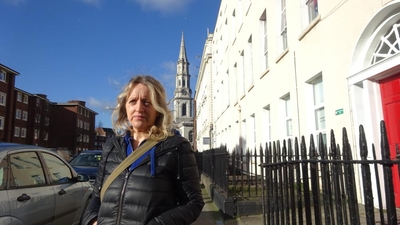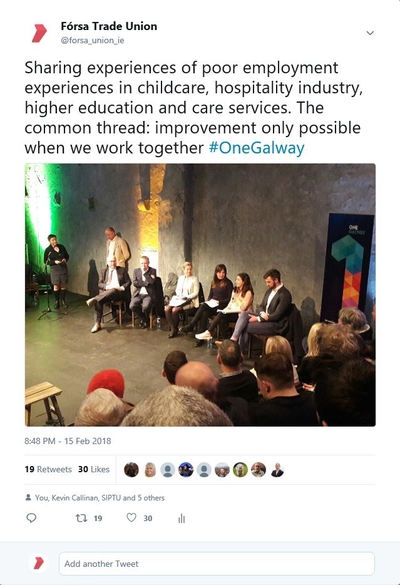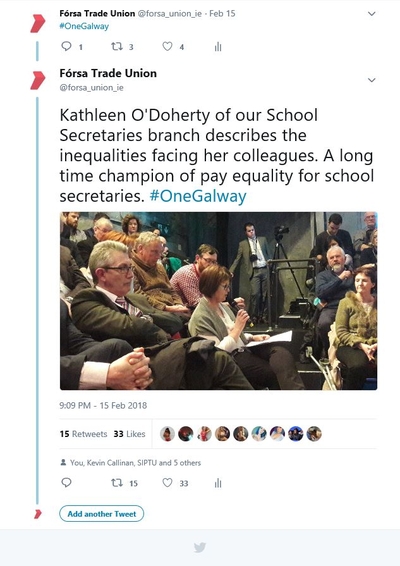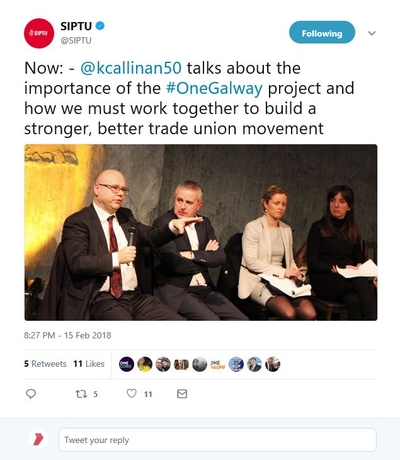Stage notes on addiction
Fórsa member Lisa Walsh readies for tour of new play
by Niall Shanahan
 Love In The Wild is a new play written by Lisa Walsh, and opens next month at the Axis theatre in Ballymun. Lisa is a member of Fórsa and a social worker in child protection services. We met last week to talk about her inspiration for the play, its development from page to stage, and her desire to challenge the stigma of addiction. Love In The Wild is a new play written by Lisa Walsh, and opens next month at the Axis theatre in Ballymun. Lisa is a member of Fórsa and a social worker in child protection services. We met last week to talk about her inspiration for the play, its development from page to stage, and her desire to challenge the stigma of addiction.
 Love In The Wild is a new play written by Lisa Walsh, and opens next month at the Axis theatre in Ballymun. Lisa is a member of Fórsa and qualified as a social worker as a mature student in 1999. She is currently working in child protection having previously worked as a medical social worker and an addiction worker. Love In The Wild is a new play written by Lisa Walsh, and opens next month at the Axis theatre in Ballymun. Lisa is a member of Fórsa and qualified as a social worker as a mature student in 1999. She is currently working in child protection having previously worked as a medical social worker and an addiction worker.
We met last week to talk about her inspiration for the play, its development from page to stage, and her desire to challenge the stigma of addiction.
“The play is a one-man show about a man called Ger Duffy. He’s from Ballymun on Dublin’s north side. He’s on a methadone programme and he’s journeying through addiction and through big changes in his life.
“He has a strong connection to wildlife and nature, which helps explain how he sees the world, a way that’s quite different to how most people see it.
“The play is about love, it’s about judgment but hopefully it’s also about redemption. He’s not the stereotype of an addict, there are many layers to Ger and many layers to his story,” Lisa explained.
Inspiration
Ger’s experience was informed and inspired by Lisa’s work in addiction services over the last 20 years. While taking part in a creative writing course five years ago, Lisa recalled a story she’d heard about one addict’s experience of visiting Ballymun swimming pool 20 years previously.
“The swimming pool was a huge feature of life for anyone who grew up in Ballymun. Swimming and Chester slices - the cakes we had after we went swimming – were a big part of the Ballymun childhood.
“He went back as an adult for a swim but he left because he became very self-conscious of being - as he called himself - a ‘junkie’. It stayed with me and came back to me when I started writing,” she said.
The play has toured in a number of addiction centres in Dublin. Lisa said the response to those performances helped to inform the development of the play. “One man told me ‘We’ve all had that walk of shame, where we were walked out of places, security man would come over and put his hand on your shoulder.’ When he described that I knew we were on to something, because it’s trying to give a voice to that experience.”
Lisa said it made her think about Ballymun and the experience of stigma. “I grew up with a lot of stigma myself, my mam had addiction problems. When I started to write lots of things came back to me, like my experience of being a little girl with my mam, and the way people treated her, and later looking at the experience of people when I worked in addiction services. It’s why I was drawn to social work in the first place.”
Love in the Wild is performed by Anto Seery, directed by Peter Sheridan and produced by Sheila & Peter Sheridan.
The play opens in the Axis theatre in Ballymun on Thursday 8th March (International Women's Day) and will tour throughout March in a number of Dublin venues.
Watch the trailer here.
More information on dates, venues and booking here.

Love in the Wild is performed by Anto Seery
 |
|
Unions to discuss water future
by Bernard Harbor
Fórsa has agreed to enter a dialogue about the future of water service delivery with the Government and employers. Like other unions however, the union has ruled out an Irish Water proposal for a single water authority.
Fórsa has agreed to enter a dialogue about the future of water service delivery with the Government and employers. But, like other unions in the water sector, the union has ruled out an Irish Water proposal for a single water authority.
Fórsas' engagement in the dialogue will commence when the union gets assurances that neither the Government nor Irish Water intends to unilaterally change current arrangements, which are based on ‘service level agreements’ between Irish Water and local authorities. Local government minister Eoghan Murphy has also given a commitment to a referendum on keeping water services in public ownership.
The unions have said they would always oppose any plan to transfer of staff out of local authorities without their agreement.
Last year, Irish Water outlined its intention to create a single water agency and employer by 2021, four years before the expiry of current service level agreements with local authorities.
Fόrsa favours streamlining the existing SLA model instead. The head of the union’s local government and municipal division, Peter Nolan, says he would consider a democratically-accountable non-commercial state board, so long as a viable future role for local authorities formed part of any reform package.
Peter is currently running a series of information meetings with Fόrsa local authority branches across the country.
Meanwhile, the union is to contribute to an ICTU presentation at an Oireachtas joint committee hearing into the matter on Thursday (22nd February).
Union tackles fly tipping disgrace
by Bernard Harbor
Fórsa’s Municipal Employees’ Division is to contact Dublin City councillors about the growing problem of fly-tipping in the capital. The move follows increased requests for council waste crews to lift illegal waste.
Fórsa’s Municipal Employees’ Division is to contact Dublin City councillors about the growing problem of fly-tipping in the capital. The divisional executive has set up a sub-committee to implement a union campaign on the issue.
The move follows increased requests for council waste crews to lift illegal waste, including ‘bagged and tagged’ rubbish that private contractors are meant to collect.
Fórsa official Tony Martin said the union had predicted that privatisation of the council’s refuse service, which happened in early 2012, would inevitably lead to an increase in fly-tipping.
“Outsourcing of waste has been a disaster from an environmental and service quality point of view, to say nothing of its impact on workers’ pay and conditions. Now council staff are lifting waste specifically designated for private operators – all at the taxpayers’ expense,” he said.
Childcare price disparities grow
by Diarmaid Mac A Bhaird
The cost of childcare in Dublin is significantly higher than in other parts of the country, according to a new report. Leitrim had the lowest average full-time childcare costs, while Dun Laoighaire-Rathdown is the most expensive.
The cost of childcare in Dublin is significantly higher than in other parts of the country, according to a new report. The study of the affordability of childcare in Ireland finds that full-time childcare for one child in Fingal costs 40% of a medium-earning worker’s net income.
Published by the union-backed Nevin Economic Research Institute (NERI), the study also found that full-time childcare for two children anywhere in Dublin costs more than the net income of a minimum wage earner.
The report examined part-time and full-time childcare costs for one-parent families with one child, and households with two children and two earners. Leitrim had the lowest average full-time childcare costs, while Dun Laoighaire-Rathdown is the most expensive.
Rural counties generally had much lower childcare costs, but the report warned that a national 4.3% rise in the price of childcare “masks” regional disparities.
The study also discusses the wider economic repercussions of the high cost of childcare in Ireland. The authors speculate that it has a detrimental effect on employment because it limits participation in the workforce.
“Ireland has some of the highest costs for full-time childcare as a proportion of disposable income in the OECD and one of the lowest spends on early childhood education as a proportion of GDP,” it says. It also suggests that increased spending on early childhood education results in long-term economic gains.
Last December, an advisory note on pay bargaining by ICTU’s Private Sector Committee highlighted “excessive” childcare costs. IMPACT – one of the three unions that recently merged to create Fórsa – had earlier made a budget submission, which called for increased spending on early childhood education following years of underinvestment.
Worker wins €50k compensation
by Linda Kelly
A Fórsa member has been awarded around €50,000 in compensation after the union spotted significant breaches of fixed-time workers’ legislation.
A Fórsa member has been awarded around €50,000 in compensation after the union spotted significant breaches of fixed-time workers’ legislation.
The union successfully argued that their local authority employer had breached the legislation by treating the worker less favourably than permanent employees. The council had failed to pay increments or issue a contract of indefinite duration.
Fórsa successfully argued that the council had breached the legislation by issuing more fixed-term contracts than the law allows.
Sports centre staff see gains
by Una Faulkner
Fórsa members in Dublin City Council’s sports and leisure centres will gain from a union agreement on service reforms. The deal was agreed with the union after consultation with members before Christmas.
Fórsa members in Dublin City Council’s sports and leisure centres will gain from a union agreement on service reforms. The deal will see the introduction of a shift allowance to workers who don’t currently get one, and there will be more promotional opportunities on foot of an almost 30% increase in the number of GO group 4 posts.
Council management proposed reforms in its sports and leisure services in late 2017. The deal was agreed with the union after consultation with members before Christmas. Fórsa also gained clarification from management on various issues.
Meanwhile, negotiations on the regularisation of a number of workers in CDETB are near conclusion. These will see pay improvements and the inclusion of Municipal Employee grades in the pension scheme.
Room to improve on pay gap
by Niall Shanahan
Report says evaluations in the four sample EU states point to a ‘bumpy ride’ in terms of gender pay gap reporting compliance.
As the focus on the gender pay gap continues, the European Foundation (Eurofound) has produced a report reviewing the experiences in four member states – Austria, Denmark, Sweden and Finland – based on their company-level gender pay reports and audits.
The report follows the European Commission’s announcement last November that further targeted measures to improve gender pay transparency may be needed at EU level.
Eurofound’s report says evaluations in the four sample states point to a ‘bumpy ride’ in terms of compliance, at least in the initial phase of rolling out the instruments in some countries. It says there’s “room for improvement in engaging employee representatives and in raising employees’ awareness.”
It says the success of any measures depend on “the extent to which the existence of unjustified gender pay gaps is acknowledged” by the various actors involved, and their willingness to engage in a meaningful dialogue and follow-up.
The Gender Pay Gap Information Bill 2017 was accepted by the Irish Government last October. The Bill, which was backed by a strong Fórsa campaign, assigns new powers to make mandatory information disclosure schemes, compelling businesses to publish details on what they pay men and women.
After extensive lobbying on the issue last year, Fórsa continues to actively engage with stakeholders within and beyond Leinster House. Discussions between Congress and the employer group Ibec are at an advanced stage. It is now expected that an agreed employer-union position will emerge from these talks.
Fórsa continues to engage with other unions and advocacy groups on the issue.
The Eurofound report is available here.
Fórsa audio news bulletin
|
Super depot fears expressed
by Bernard Harbor
Plans for a Dublin City Council 'super depot' sparks concern amongst Fórsa members in Ballymun.
Fórsa members in Ballymun, north Dublin, have expressed concerns about the progress of plans for a ‘super depot,’ which is to be built by Dublin City Council close to the IKEA store. The union has sought a union-management working group to discuss related issues, and it will be seeking nominations to this working group from amongst its Municipal Division members who work in the area.
Special Olympics volunteers wanted
by Diarmaid Mac A Bhaird
The Special Olympics Ireland games are fast approaching and volunteers are needed.
A call for 2,500 volunteers to work at this summer’s Special Olympics Ireland games has been launched. The games, which will feature over 1,600 athletes, are taking place in Dublin from the 14th-16th June.
Last month’s high-profile launch of the volunteer drive featured Dublin forward Dean Rock, as well as some of the athletes who will be competing at the games. The call for volunteers is being championed by Maria Ryan, a former PSEU president.
Maria has called on Fórsa members to get involved in the games and to sign up to volunteer.
The three day event will be staged in venues around the capital including the Sport Ireland national sports campus in Blanchardstown. Volunteers for the event will be based in either DCU or UCD for the duration of the three days, and these institutions are among the numerous organisations getting behind the games.
You can volunteer HERE.
Trade unions and students launch One Galway
by Niall Shanahan
The ONE Galway initiative was launched last week (Thursday 15th February) with a packed house at the Mick Lally Theatre in Galway City.
The ONE Galway initiative was launched last week (Thursday 15th February) with a packed house at the Mick Lally Theatre in Galway City.
The project is a collaborative initiative comprising trade and student unions operating in the Galway area, supported by the Irish Congress of Trade Unions and the Galway Council of Trade Unions.
Fórsa deputy general secretary Kevin Callinan, who was one of the speakers at the event, explained: “The aim of the project is to foster a deeper engagement and collaboration between trade unions, student unions and community groups at workplace and societal levels to organise, campaign, educate and communicate with workers and the wider community.
“Building on the successful model established by the ONE Cork initiative, launched in 2016, ONE Galway is about organising workers, their families and communities to influence change and create a future within which there is access to decent work, decent pay and a decent standard of living for all,” he said.
Precarious work
The initial campaign focus for ONE Galway will be on precariousness and the exploitation of workers. The launch event featured a strong presentation on the issue from Dr Michelle O’Sullivan of the University of Limerick.
In her presentation, Dr O’Sullivan said “Precariousness, at its heart, is about uncertainty, and every problem, every poor outcome that workers have is because of uncertainty. Whether its hours, job or social insecurity, it’s about uncertainty.”
Dr O’Sullivan said many employers like to think of full-time, permanent jobs as something “of the past” and said she was “highly sceptical” when employers claimed that millennials were no longer interested in full-time, permanent jobs. She said it was important to challenge the claim that more secure working arrangements was a thing of the past.
Members of the audience joined the discussion to share their experiences of poor quality employment in childcare, the hospitality industry, higher education and in care services. Most of the contributions emphasised that improvement is only possible when people work together to secure them.
Campaigns
While similar to the Cork initiative, ONE Galway’s focus lies in a broader organisational engagement from the outset, where student unions are working alongside their trade union counterparts on campaigns such as housing needs, in addition to the campaign focus on precarious working.
Joe Cunningham, the general secretary designate of SIPTU, said: “ONE Galway will also work to better equip and increase the capacity of the trade union movement in Galway city and county to deal together with the many different challenges which face workers, particularly students, younger workers and those from our migrant communities.”
Kevin added: “It’s about consolidating the strength, resources and expertise locally of all these organisations and building a stronger network to improve living and working conditions and achieve significant gains for all workers through greater trade union and civic participation.”
  
Survey results: Will a robot take your job?
In the last edition of the news bulletin we asked Fórsa members if they had concerns that a robot might eventually take over their job.
In the last edition of the news bulletin we asked Fórsa members if they had concerns that a robot might eventually take over their job.
Of those who took the survey, 51% of respondents said they weren't worried about their own job, but they were concerned for others, while 41% confidently stated that a robot could not do their job.
A few people have genuine concerns, with just 8% stating that their job is likely to be automated in the future.
The automation of work and the development of Artificial Intelligence (AI) technology is an issue of growing interest for Fórsa. Both developments present huge challenges for workers and unions, and we will bring you more on this in the coming months as part of the Fórsa Insights podcast series.
Fórsa FAQs
your questions answered
|
|
|